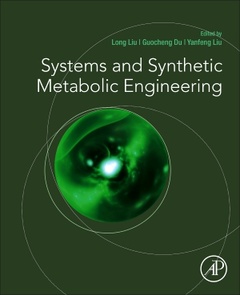Description
Systems and Synthetic Metabolic Engineering
Coordinators: Liu Yanfeng, Du Guocheng, Liu Long
Language: English
Subject for Systems and Synthetic Metabolic Engineering:
294 p. · 19x23.3 cm · Paperback
Description
/li>Contents
/li>Biography
/li>Comment
/li>
Systems and Synthetic Metabolic Engineering provides an overview of the development of metabolic engineering within medicine that is fueled by systems and synthetic biology. These newly developed, successful strategies of metabolic engineering guide the audience on how to propose and test proper strategies for metabolic engineering research. In addition to introductory, regulatory and challenges in the field, the book also covers dynamic control and autonomous regulation to control cell metabolism, along with computational modeling and industrial applications. The book is written by leaders in the field, making it ideal for synthetic biologists, researchers, students and anyone working in this area.
1. Systems biology, synthetic biology and metabolic engineering2. Synthetic regulatory elements for fine-tuning gene expression3. Systems and synthetic biology-aided biosynthesis pathway design4. Refactoring and optimization of metabolic network5. Harnessing the hierarchy of transcriptional regulation: engineering of the gene expression network for efficient production of biofuels6. Systems metabolic engineering strategies for cell factories construction7. High throughput screening for improving cellular and enzymatic properties8. In vitro metabolic engineering: current status and recent progress9. Systems and synthetic metabolic engineering for production of biochemicals10. Systems and synthetic metabolic engineering: Challenges and prospects
Professor Guocheng Du is the Dean of School of Biotechnology, Jiangnan University, China. He is the distinguished professor of Changjiang Scholars, Ministry of Education, China. His current main research focus is on bioprocess engineering and metabolic engineering. He has about 200 publications/communications, which include 52 patents, 8 books, 160 original and review papers, etc. He won two Second Prizes of State Science and Technology Award in 2006 and 2012, respectively. He has been conferred Honorary Doctorate degree from Jiangnan University, China. Professor Guocheng Du is deputy director in the committee of biochemical engineering modelling and control, Chinese Society for Microbiology, and deputy director of Beer Branch, China Alcoholic Drinks Industry Association. He is the associate editor of Journal of the Science of Food and Agriculture and the editorial board member of Bioresource Technology.
Dr. Long Liu is currently a life-time professor at School of Biotechnology, Jiangnan University, Wuxi, China. He has been working in the area of bioprocess engineering and met
- Discusses the current progress of metabolic engineering, focusing on systems biology and synthetic biology
- Covers introductory, regulatory, strategies, production and challenges in the field
- Written technically for synthetic biologists, researchers, students, industrialists, policymakers and stakeholders
These books may interest you

Synthetic Biology and Metabolic Engineering in Plants and Microbes Part A: Metabolism in Microbes 172.74 €



